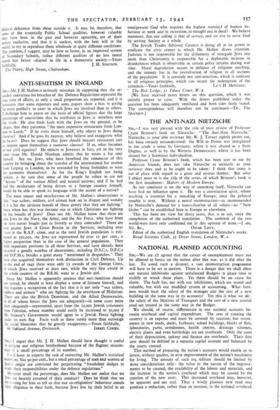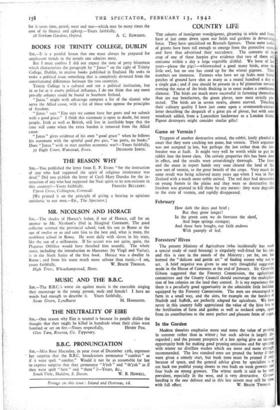NATIONAL PLANNED ACCOUNTING
Snt,—We are all agreed that the cancer of unemployment must not be allowed to fasten on the nation after this war. as it did after the last. To avoid such a disaster, a vast reconstruction programme will have to be set in motion. There is a danger that we shall allow our natural inhibitions against unbalanced Budgets ../1 peace time to stultify or wreck these plans. Yet there should be no cause for alarm. The fault lies, not with our inhibitions, which are sound and valuable, but with our muddled system of accounting.. What busi- ness would treat the salary of the manager and the cost of a new building in the same way in its accounts? Yet this is what we do: the salary of the Minister of Transport and the cost of a new arterial road are treated in the same way in the Budget.
We should, of course, differentiate in our national accounts he- tween overhead and capital expenditure. The cost of running the country is an expense and must be covered by taxation; but invest- ments in new roads, docks, harbours, school buildings, blocks of flats, laboratories, parks, aerodromes, health. centres, drainage schemes, electric plants and even battleships are not overheads. Only the costs of their .depreciation upkeep and finance are overheads. Their first cost should be debited to a separate capital account and balanced by the assets created.
This method of preparing the nation's accounts would enable us to invest, without qualms, in wise improvements of the nation's machinery for living. The amount of such expenditure should be limited by three considerations only : the value to the nation of the improve- ments to be created, the availability of the labour and materials, and the increase in the nation's overhead which may be caused by the creation of the new asset. This increased overhead may, however, be apparent and not real. Tbus a wisely plumes] new road may produce a reduction, rather than an increase, in the national overhead, for it saves time, petrol, wear and tear—which may be many times the cost of its finance and upkeep.—Yours faithfully,



























 Previous page
Previous page